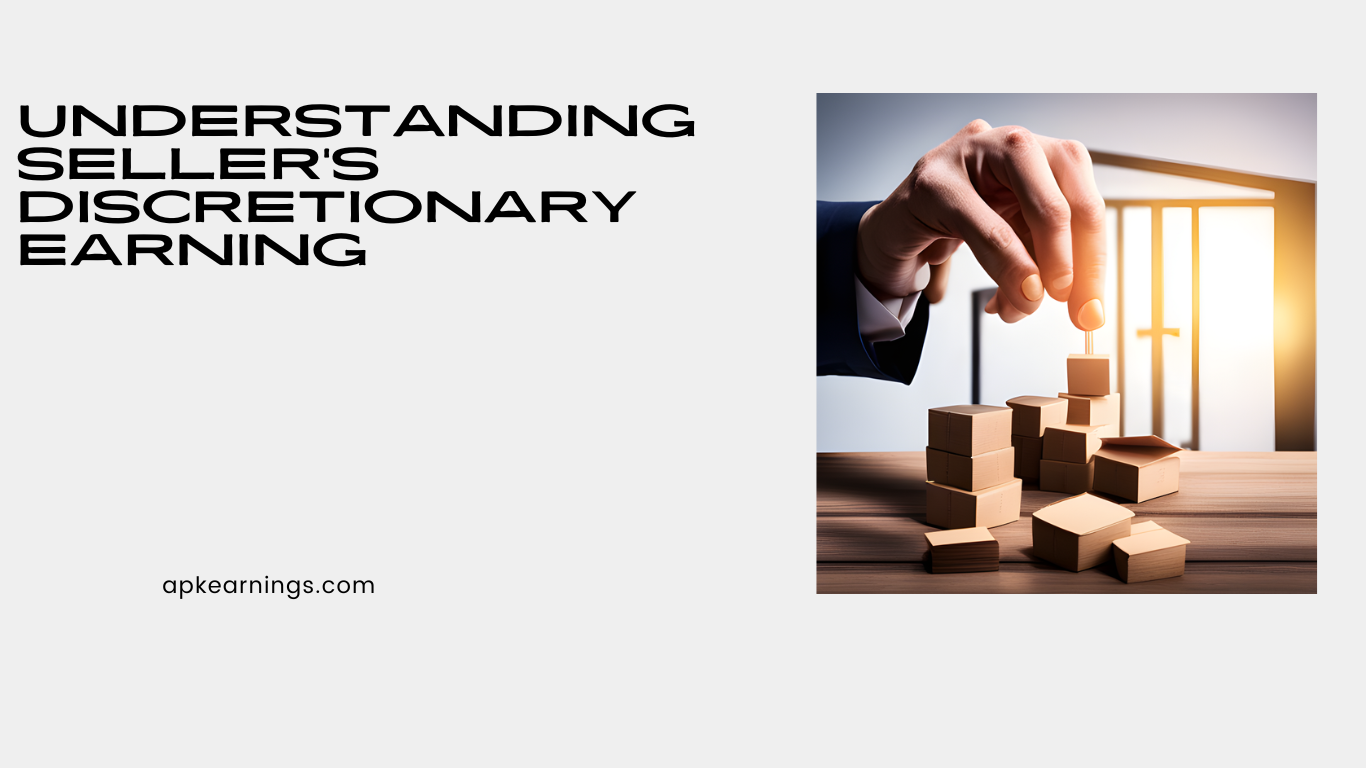Seller’s Discretionary Earning when it comes to evaluating a business, investors and potential buyers often delve into financial statements and profit margins. However, to truly comprehend the profitability and viability of a business, one must grasp the concept of Seller’s Discretionary Earnings (SDE). In this article, we will explore the nuances of SDE, its significance, and how it serves as a vital metric in business valuation.
Decoding Seller’s Discretionary Earnings
At its core, Seller’s Discretionary Earnings represent the total financial benefits enjoyed by a business owner. It includes not only the net profit but also various non-operational and discretionary expenses that can be adjusted. These adjustments provide a clearer picture of the business’s actual earning potential, making SDE a more accurate reflection of its value compared to simple net profit calculations.
The Components of Seller’s Discretionary Earnings
SDE comprises a multitude of elements, such as owner’s Seller’s Discretionary Earnings, benefits, and perks, non-recurring expenses, personal expenses, and any other discretionary expenses. By adding back these expenses to the net profit, potential buyers can assess the true financial health of the business, making it an essential metric during negotiations.
Significance in Business Valuation
When valuing a business, investors seek a comprehensive understanding of its profitability and sustainability. SDE, by providing a holistic view of the owner’s benefits and operational flexibility, offers a more accurate valuation. Unlike net profit, which might be affected by one-time expenses, SDE smoothens out these irregularities, aiding investors in making informed decisions. Seller’s Discretionary Earnings.
Calculating Seller’s Discretionary Earnings: A Step-by-Step Guide
Calculating SDE involves meticulous analysis of the financial records. This section will delve into the step-by-step process of arriving at the accurate SDE figure. It will cover aspects such as identifying discretionary and non-operational expenses, understanding owner compensation, and making necessary adjustments to arrive at the final SDE value. Seller’s Discretionary Earnings.
Real-Life Applications: How SDE Impacts Business Transactions
This section will explore real-life case studies and examples where SDE played a pivotal role in business transactions. By understanding how SDE influenced these deals, readers can appreciate the practical implications and significance of this metric in the business world. Seller’s Discretionary Earnings.
Potential Pitfalls and Challenges in SDE Calculation
While SDE is a powerful tool, it comes with its own set of challenges. This section will discuss common pitfalls in SDE calculation, such as identifying discretionary expenses accurately and dealing with complex financial structures. By being aware of these challenges, both buyers and sellers can navigate the process more effectively. Seller’s Discretionary Earnings.
Importance of SDE in Small Business Transactions
In the realm of small business transactions, understanding Seller’s Discretionary Earnings is paramount. Small businesses often have unique financial structures, and SDE helps potential buyers assess the real income generating potential. By comprehending the importance of SDE in this context, entrepreneurs can make informed decisions when venturing into new business opportunities.
SDE vs EBITDA: Making the Right Comparison
While Seller’s Discretionary Earnings Before Interest, Taxes, Depreciation, and Amortization (EBITDA) is a widely used metric, comparing it with SDE reveals crucial insights. This section will dissect the differences between SDE and EBITDA, highlighting when and why SDE is a more relevant metric, especially for businesses with discretionary expenses.
Enhancing Business Strategies through SDE Analysis
Beyond its role in transactions, SDE analysis can significantly impact business strategies. By identifying and optimizing discretionary expenses, businesses can enhance their overall profitability. This section will explore how entrepreneurs and business owners can leverage SDE analysis as a strategic tool, leading to improved financial efficiency and long-term sustainability. Seller’s Discretionary Earnings.
SDE and Business Sustainability: A Symbiotic Relationship
Sustainable business practices are at the forefront of the modern entrepreneurial landscape. Here, we will explore how SDE aligns with the concept of business sustainability. By accurately assessing a business’s true earnings potential, entrepreneurs can make Seller’s Discretionary Earnings financially sound decisions that not only benefit them but also contribute to the sustainable growth of their enterprises, fostering a symbiotic relationship between financial health and environmental responsibility.
SDE in the Entrepreneurial Toolkit: A Comprehensive Guide
Entrepreneurs wear many hats, and having a comprehensive toolkit is essential. Understanding SDE is akin to having a powerful instrument in this toolkit. This section will provide entrepreneurs with a step-by-step guide on how to utilize SDE effectively. From calculating SDE to leveraging it for strategic decision-making, this guide will empower entrepreneurs to navigate the complex terrain of business ownership successfully.
Future Trends: SDE in the Digital Age

As technology continues to reshape industries, it also impacts how businesses are valued and transacted. This section will explore the future trends of SDE in the digital age. From utilizing artificial intelligence in SDE calculations to blockchain’s role in transparent financial reporting, readers will gain insights into how technology is revolutionizing the way SDE is perceived and utilized in the business world.
Empowering Entrepreneurs Worldwide
In this final section, we will reflect on the overarching impact of SDE on the global entrepreneurial landscape. By empowering entrepreneurs with a more accurate understanding of business profitability, SDE fosters economic growth, encourages innovation, and creates a conducive environment for sustainable entrepreneurship worldwide. As a catalyst for informed decision-making, SDE continues to shape the future of business transactions and entrepreneurship, making it an indispensable tool for success in the ever-evolving business world.
SDE and Risk Management: Navigating Uncertainties in Business
In the volatile world of business, uncertainties are inevitable. This section delves into how understanding Seller’s Discretionary Earnings can aid in risk management. By accurately assessing a business’s earning potential, entrepreneurs can make proactive decisions, mitigate risks, and build resilient business models that withstand economic fluctuations and unforeseen challenges.
SDE and Investment Diversification: A Strategic Approach
Investors often seek diversification to minimize risks and optimize returns. Here, we explore how SDE plays a pivotal role in investment diversification strategies. By evaluating businesses based on their true earning potential, investors can diversify their portfolios effectively, ensuring a balanced investment mix that spans various industries and sectors, ultimately leading to more stable and profitable investment ventures.
SDE: A Game-Changer for Startup Valuations
Startups, with their unique financial structures and rapid growth trajectories, require specialized valuation methods. This section sheds light on how SDE is revolutionizing startup valuations. By factoring in discretionary expenses and owner benefits, investors and venture capitalists can accurately gauge a startup’s profitability, enabling them to make strategic investment decisions that support the startup ecosystem’s growth and innovation.
SDE and Due Diligence: The Cornerstone of Informed Decisions
In any business transaction, due diligence is paramount. Here, we explore how SDE serves as the cornerstone of informed due diligence. Buyers can rely on SDE to validate financial claims made by sellers, ensuring transparency and integrity throughout the transaction process. By conducting rigorous due diligence backed by SDE analysis, parties involved in business transactions can foster trust and confidence, leading to smoother negotiations and successful deals.
SDE in Tax Planning: Maximizing Profitability and Minimizing Liabilities
Taxes are a significant consideration for businesses and entrepreneurs. This section elucidates how SDE impacts tax planning strategies. By accurately assessing a business’s discretionary earnings, entrepreneurs can optimize their tax planning, minimizing liabilities and maximizing profitability. Understanding the tax implications of SDE empowers businesses to make strategic financial decisions that align with their long-term fiscal goals.
SDE and Business Loans: Facilitating Access to Capital
Here, we explore how SDE influences a business’s ability to secure loans and financing. Lenders often rely on a business’s earning potential to assess loan eligibility. By showcasing a higher SDE, businesses can enhance their creditworthiness, opening doors to favorable loan terms and increased funding opportunities, thereby catalyzing business development and market expansion.
SDE and Entrepreneurial Education: Empowering the Next Generation
Education is the foundation of entrepreneurship. This section discusses the role of SDE in entrepreneurial education. By integrating SDE concepts into entrepreneurship curricula, educational institutions can equip future entrepreneurs with essential financial acumen. Understanding SDE prepares aspiring business leaders for the complexities of real-world financial management, enabling them to make informed decisions and establish successful enterprises.
A Paradigm Shift in Business Valuation

In this section, we reflect on how Seller’s Discretionary Earnings signify a paradigm shift in business valuation methodologies. Historically, businesses were valued based on conventional metrics like net profit. However, the nuanced approach offered by SDE, incorporating various discretionary and non-operational expenses, has transformed the way businesses are assessed. This paradigm shift signifies a more accurate, holistic, and dynamic valuation method that aligns with the intricacies of modern entrepreneurship and the global business landscape.
SDE and Economic Development: Fostering Entrepreneurship Globally
The impact of Seller’s Discretionary Earnings extends far beyond individual businesses. In this section, we explore how a comprehensive understanding of SDE can foster entrepreneurship on a global scale. By empowering entrepreneurs with accurate financial insights, SDE becomes a catalyst for economic development, job creation, and community growth. It nurtures a thriving entrepreneurial ecosystem, driving innovation and economic progress in regions around the world.
SDE and Ethical Business Practices: Promoting Transparency and Integrity
Ethics are the cornerstone of sustainable businesses. Here, we discuss how SDE promotes ethical business practices. By incorporating all financial aspects transparently, SDE encourages businesses to operate with integrity. This transparency builds trust with stakeholders, including customers, suppliers, and investors, fostering long-term relationships and establishing a positive reputation in the market.
SDE in Mergers and Acquisitions: Ensuring Smooth Transitions
Mergers and acquisitions are complex processes. This section explores how SDE simplifies these transitions. By providing a clear picture of the seller’s earnings, SDE aids in negotiations, ensuring that the acquiring party understands the true value of the business. This understanding minimizes post-transaction surprises, leading to smoother integrations and more successful mergers and acquisitions.
SDE and Family Businesses: Preserving Legacies and Ensuring Succession
Family businesses form the backbone of many economies. Here, we delve into the role of SDE in family businesses. By accurately assessing the business’s profitability, SDE aids in succession planning. It ensures a smooth transition from one generation to the next, preserving the family legacy while equipping the new leadership with the financial insights needed for sustainable growth and continued success.
SDE and Social Entrepreneurship: Maximizing Social Impact
Social entrepreneurship focuses on creating positive social change. In this section, we explore how SDE supports social entrepreneurs. By providing a realistic view of a business’s financial health, SDE helps social entrepreneurs make informed decisions. This enables them to allocate resources effectively, maximizing their social impact and contributing meaningfully to addressing societal challenges.
SDE in Technology Startups: Navigating the Innovation Landscape
Technology startups operate in a fast-paced, ever-changing environment. This section discusses the relevance of SDE in the tech startup landscape. By understanding the true earning potential, investors and founders can make strategic decisions, fostering innovation and entrepreneurship in technology sectors. SDE offers a stable financial foundation upon which startups can build groundbreaking technologies, attracting further investments and driving technological advancements.
SDE and Entrepreneurial Empowerment: Fostering Inclusivity
Entrepreneurship should be accessible to all. This section explores how SDE fosters inclusivity. By providing a clear financial picture, SDE levels the playing field, allowing entrepreneurs from diverse backgrounds to participate in the business landscape. In this way, SDE acts as a tool for empowering marginalized communities, fostering diversity, and promoting equal opportunities in entrepreneurship.
SDE and Environmental Sustainability: Encouraging Eco-Friendly Practices
Environmental sustainability is a global concern. Here, we discuss how SDE encourages eco-friendly business practices. By understanding the financial implications of environmental initiatives, businesses can invest in sustainable practices without compromising profitability. SDE empowers businesses to adopt environmentally responsible strategies, contributing to the global effort for a greener and more sustainable future.
SDE and Government Policies: Shaping Entrepreneurial Support Programs
Government policies play a pivotal role in supporting entrepreneurship. This section explores how SDE influences policy-making. By providing accurate data on small business profitability, SDE helps governments design targeted support programs. These initiatives, informed by SDE analysis, can provide financial assistance, training, and resources where they are needed most, fostering a conducive environment for entrepreneurship and economic growth.
SDE: A Continuously Evolving Metric in the Business Landscape
In this section, we reflect on how Seller’s Discretionary Earnings continues to evolve. The business landscape is dynamic, and SDE adapts to the changing needs of entrepreneurs and investors. As new industries emerge and entrepreneurial ventures diversify, SDE remains a fundamental metric, evolving to encompass innovative financial structures and ensuring its relevance in the ever-changing world of business.
Embracing the Future: SDE as a Pillar of Entrepreneurial Success
In conclusion, Seller’s Discretionary Earnings stands as a pillar of entrepreneurial success. It transcends conventional financial metrics, providing a nuanced, inclusive, and adaptable approach to understanding business profitability. By embracing SDE, entrepreneurs, investors, and policymakers alike are equipped with a powerful tool that navigates the complexities of modern business. In the spirit of innovation and collaboration, SDE paves the way for a future where entrepreneurship thrives, economies prosper, and businesses become not just financial entities, but beacons of positive change and sustainable growth in the global community.
Conclusion
In conclusion, Seller’s Discretionary Earnings stand as a critical metric in business valuation, offering a nuanced perspective that goes beyond traditional profit margins. For buyers, it provides a realistic view of the business’s potential, guiding their investment decisions. For sellers, understanding SDE can facilitate smoother negotiations and lead to more favorable deals. As the business landscape continues to evolve, a comprehensive grasp of SDE is indispensable for anyone involved in buying or selling businesses, making it an indispensable tool in the realm of entrepreneurship and investments.
for more ……………….. click here





